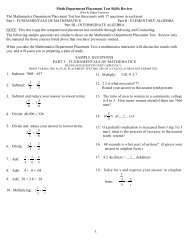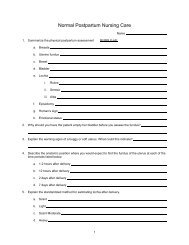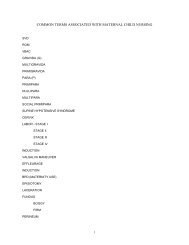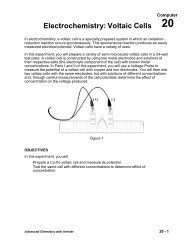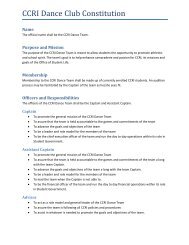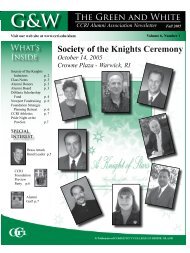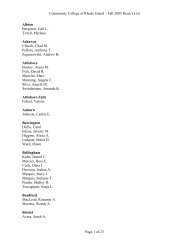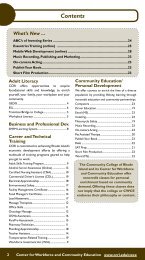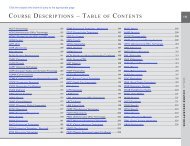Course Descriptions - Community College of Rhode Island
Course Descriptions - Community College of Rhode Island
Course Descriptions - Community College of Rhode Island
Create successful ePaper yourself
Turn your PDF publications into a flip-book with our unique Google optimized e-Paper software.
discussed. Recognition <strong>of</strong> normal anatomy<br />
and measurements will be addressed. Recognition<br />
<strong>of</strong> scanning windows and imaging<br />
planes will be addressed. Basic scanning<br />
techniques, specific protocols and echocardiographic<br />
findings will be discussed in<br />
the normal and abnormal conditions. The<br />
basic development <strong>of</strong> the ability to perform<br />
examinations in these areas will occur<br />
with classroom experience using real-time<br />
equipment with transthoracic, and Doppler<br />
and color Doppler display modes. (Prerequisite:<br />
DMSD 2100) Lecture: 3 hours<br />
DMSD 2261 - Echocardiography II -<br />
3 Credits<br />
This course expands on the material presented<br />
in Echocardiography I and continues<br />
to provide students with the knowledge<br />
necessary to capably perform a complete<br />
and diagnostic echocardiographic examination<br />
using M-Mode, two-dimensional, Doppler<br />
and color Doppler modalities. More<br />
complex anatomy and abnormal pathology<br />
are addressed. Scanning techniques, specific<br />
protocols and echocardiographic findings<br />
will be discussed in relation to these more<br />
complex abnormalities. The development<br />
<strong>of</strong> the ability to perform examinations in<br />
these areas will occur with classroom<br />
experience using real-time equipment<br />
with transthoracic, and Doppler and color<br />
Doppler display modes. (Prerequisite: DMSD<br />
2260) Lecture: 3 hours<br />
DMSD 2262 - Advanced<br />
Echocardiography - 3 Credits<br />
This course expands on the material presented<br />
in Echocardiography I and II and<br />
continues to provide students with the<br />
knowledge necessary to capably perform<br />
a complete and diagnostic echocardiographic<br />
examination using M-Mode, twodimensional,<br />
Doppler and color Doppler<br />
modalities. This course concentrates on<br />
the recognition and interpretation <strong>of</strong> more<br />
complex abnormal anatomy and disease<br />
states. Scanning techniques, specific pro-<br />
tocols and echocardiographic findings will<br />
be discussed in relation to these abnormal<br />
conditions. The development <strong>of</strong> the ability<br />
to perform examinations in these areas<br />
occurs with classroom experience using<br />
real-time equipment with transthoracic,<br />
and Doppler and color Doppler display<br />
modes. (Prerequisite: DMSD 2261) Lecture:<br />
3 hours<br />
DMSD 2263 - Echocardiography<br />
Practicum I - 3 Credits<br />
This practicum involves the observation and<br />
initial scanning experience <strong>of</strong> transthoracic<br />
adult cardiac sonographic examinations<br />
with emphasis on normal two-dimensional,<br />
M-Mode and Doppler pattern recognition.<br />
Students are under the supervision <strong>of</strong> a<br />
registered echocardiographer. (Prerequisite:<br />
DMSD 2260) Clinical: 32 hours per week<br />
DMSD 2264 - Echocardiography<br />
Practicum II - 3 Credits<br />
This practicum involves the clinical performance<br />
<strong>of</strong> transthoracic adult cardiac<br />
sonographic examinations with emphasis<br />
on normal two-dimensional, M-Mode and<br />
Doppler pattern recognition. Students are<br />
under the supervision <strong>of</strong> a registered echocardiographer.<br />
(Prerequisite: DMSD 2263)<br />
Clinical: 32 hours per week<br />
DMSD 2265 - Echocardiography<br />
Practicum III - 3 Credits<br />
This practicum involves the clinical performance<br />
<strong>of</strong> transthoracic adult cardiac<br />
sonographic examinations with emphasis<br />
on normal two-dimensional, M-Mode and<br />
Doppler pattern recognition. Focus is on<br />
performing complete exams on patients<br />
with complex disease states. Students are<br />
under the supervision <strong>of</strong> a registered echocardiographer.<br />
(Prerequisite: DMSD 2264)<br />
Clinical: 32 hours per week<br />
DMSD 2500 - Diagnostic Medical<br />
Sonography Seminar - 3 Credits<br />
This is an interactive course combining<br />
general abdominal students, echocardiography<br />
students and vascular students. This<br />
provides students with an opportunity<br />
to discuss their scanning experience and<br />
review skills necessary for pr<strong>of</strong>essional<br />
practice. Students prepare a research project<br />
on a topic in their area <strong>of</strong> specialty. This<br />
includes patient history, clinical findings,<br />
anatomy, pathology, scanning protocols,<br />
image interpretation, differential diagnosis<br />
and patient care. Students prepare and<br />
deliver an oral presentation to the class<br />
based on their research using PowerPoint<br />
or other appropriate methods. (Prerequisite:<br />
DMSD 2240 or DMSD 2262 or DMSD<br />
2252) Lecture: 3 hours<br />
eCon (eConomiCS)<br />
ECON 2030 - Principles <strong>of</strong><br />
Microeconomics - 3 Credits<br />
(formerly ECON 2020)<br />
This course studies economic principles<br />
with emphasis on the price system,<br />
resource allocation, industrial organization,<br />
international trade and comparative<br />
economic systems. (Prerequisite: MATH at<br />
the 0600 level required, MATH 1200 recommended)<br />
Lecture: 3 hours<br />
ECON 2040 - Principles <strong>of</strong><br />
Macroeconomics - 3 Credits<br />
(formerly ECON 2010)<br />
This course studies the fundamental principles,<br />
problems and policies <strong>of</strong> the American<br />
economic system. Major emphasis is placed<br />
on the institutions <strong>of</strong> the economy, supplydemand<br />
analysis, national income theory,<br />
monetary and fiscal policy and growth<br />
analysis. (Prerequisite: MATH at the 0600 level<br />
required, MATH 1200 recommended) Lecture:<br />
3 hours<br />
Prerequisite: Successful completion <strong>of</strong> course required before registering. Corequisite: <strong>Course</strong> must be taken prior to or at the same time.<br />
dmsd-econ-emer<br />
emer (emergenCy<br />
mAnAgemenT)<br />
EMER 1000 - Fundamentals <strong>of</strong><br />
Emergency Management - 3 Credits<br />
This course provides information that enables<br />
persons entering the pr<strong>of</strong>ession or expanding<br />
their roles to function effectively with a broad<br />
array <strong>of</strong> emergency management issues. The<br />
primary purpose is to provide an overview<br />
<strong>of</strong> the characteristics, functions, resources<br />
and capabilities <strong>of</strong> an integrated system<br />
and how various emergency management<br />
services (EMA, fire, police/security, EMS,<br />
health care providers, etc.) work together<br />
effectively. Emphasis is placed on how this<br />
system is applied to all government levels,<br />
across the four phases and all functions <strong>of</strong><br />
emergency management. It includes the<br />
role <strong>of</strong> national, regional and local services in<br />
a variety <strong>of</strong> disasters. This course is intended<br />
for a broad audience including personnel<br />
in public safety, emergency management,<br />
health care facilities, and others having an<br />
interest in gaining a working knowledge <strong>of</strong><br />
preparedness. Lecture: 3 hours<br />
EMER 1010 - Understanding and<br />
Responding to Terrorism - 3 Credits<br />
This course provides students with an<br />
understanding <strong>of</strong> defining terrorism. Students<br />
learn about its origins and the development<br />
<strong>of</strong> using terror to influence public<br />
policy decisions. The history and changing<br />
nature <strong>of</strong> terrorist organizations are also<br />
presented. Terrorist groups and structure<br />
are discussed. Individual and community<br />
awareness <strong>of</strong>, preparing and responding to<br />
terrorist acts are presented. This course is<br />
intended for anyone interested in learning<br />
more about terrorism. Lecture: 3 hours<br />
EMER 1020 - Bioterrorism and Public<br />
Health Emergencies - 3 Credits<br />
This course focuses on both naturally<br />
occurring disease outbreak and bioterrorist<br />
events <strong>of</strong> the past and the implications<br />
<strong>of</strong> these events for the future. Key elements<br />
163



